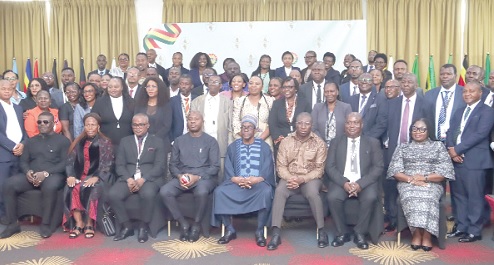The Speaker of Parliament, Alban Sumana Kingsford Bagbin, has said that inaccurate or unverified parliamentary reporting risks “damaging and destroying democracy,” particularly within Africa’s consensus-driven political culture.
He said that the official parliamentary record or Hansard must reflect proceedings “as nearly as possible” because misrepresenting proceedings could undermine public trust in democratic institutions.
The Speaker said this at the 11th biennial conference of the Commonwealth Hansard Editors Association – Africa Region (CHEA-AR), in Accra yesterday.
The five-day conference is on the theme: “Charting the future of Hansard: Embracing innovation and technology for enhanced parliamentary reporting in Africa.”
Hansard professionals, along with parliamentary reporters and editors from Africa and the Commonwealth, are attending to share best practices and explore innovations in legislative reporting.
Capacity-building
Mr Bagbin traced the historical evolution of parliamentary reporting from the Magna Carta in 1215 to the first Hansard in 1844.
He said that while technological change shaped reporting, human editorial oversight remained critical.
“Innovation must go hand in hand with training and professional development.
We must, as institutions, invest in the continued growth of our hands-on processes and ensure they are equipped not only to use new tools, but to lead in the development of the tools,” the Speaker said.
He also raised concerns about some external bodies, including ministries and international partners, making attempts to impose systems unsuitable for the country’s parliamentary context.
Such attempts, Mr Bagbin said, had previously failed because they were designed for jurisdictions with different parliamentary traditions.
He called for parliaments to retain control over their reporting systems and technology upgrades.
Technology
The Speaker also mentioned the growing threat of digital manipulation, where Artificial Intelligence (AI) and editing tools could be used to fabricate speeches or alter video footage.
He stressed the need for secure systems to protect the integrity of parliamentary records and for African parliaments to bridge the digital divide between countries.
The Speaker further advocated the inclusion of local languages in Hansard reporting, saying that nations that developed the usage of their languages progressed faster.
He further urged governments and parliaments to invest in the growth of Hansar processes, including providing resources and recognition of reporting staff.
Mr Bagbin added that they must embrace technology to promote transparency and accountability.
Innovation
Editor of Debates in Parliament, Adam Iddrisu, also stressed the need to balance tradition with innovation in parliamentary reporting.
He listed opportunities provided by digital tools such as AI-assisted transcription, real-time translation, and advanced editing software while urging preservation of core editorial values—accuracy, neutrality, originality, completeness and professionalism.
Mr Iddrisu said that 17 presentations at the conference would centre on issues such as ethics, social media, and the role of the Hansard in research, collaboration and professional bonds across the region.

